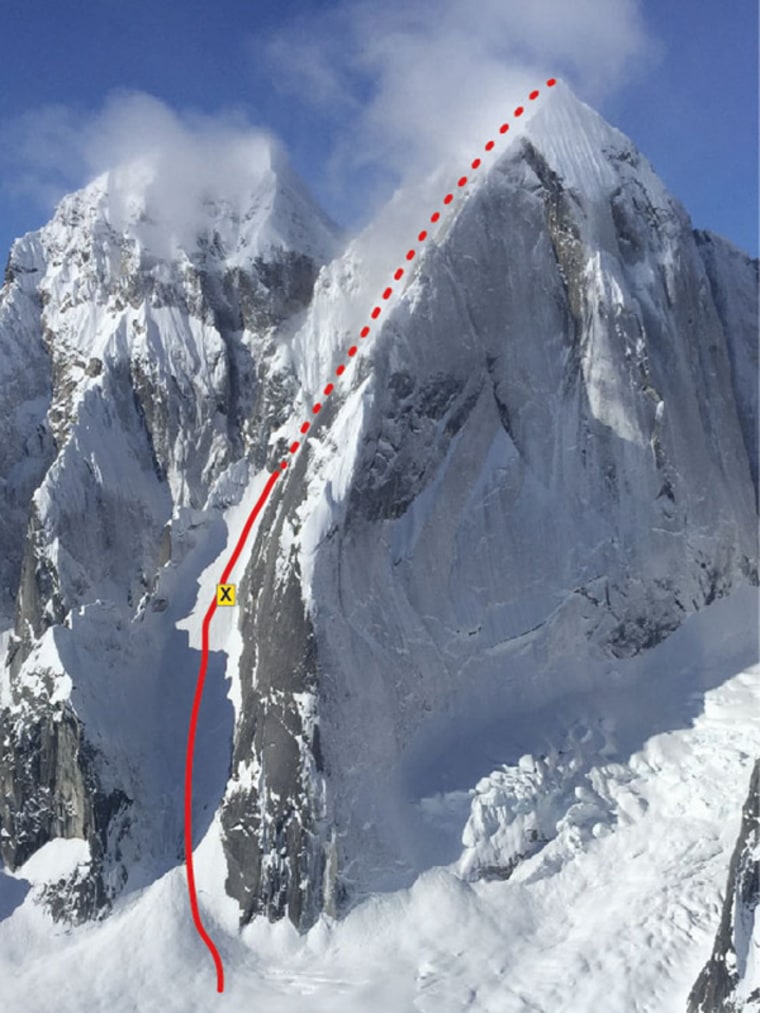
A
climber
who died
after
falling
1,000
feet
in
Alaska’s
Denali
National
Park
and
Preserve was
identified
on
Saturday
as
Robbi
Mecus,
a
noted
climbing
enthusiast
and
forest
ranger.
Mecus,
52,
from
Keene
Valley,
New
York,
was
an
outspoken
advocate
for
expanding
the
presence
of
fellow
transgender
people
in
alpine
climbing.
In
2022,
she
co-founded Queer
Ice
Fest in
the
Adirondack
Mountains
of
her
adopted
hometown,
and
the
event
earlier
this
year
was
its
third
annual
happening.
New
York
Department
of
Environmental
Conservation
interim
Commissioner
Sean
Mahar
said
in
a
statement
that
Mecus
made
a
mark
in
her
long
career
with
the
state.
“Over
her
25-year
career
with
DEC,
Ranger
Mecus
demonstrated
an
unparalleled
passion
for
protecting
the
environment
and
New
Yorkers,”
the
commissioner
said.
“She
exemplified
the
Forest
Rangers’
high
standard
of
professional
excellence
while
successfully
…
advancing
diversity,
inclusion,
and
LGBTQ
belonging
throughout
the
agency.”
Her
body
was
recovered
Saturday
morning
after
rescuers
decided
to
halt
their
recovery
efforts
Friday
amid
challenging
conditions
on
the
park’s
Mount
Johnson,
where
Mecus’
climbing
partner
survived
after
falling
with
her,
the
National
Park
Service
said
in
a
statement.
The
survivor,
who
wasn’t
identified,
was
described
by
the
service
as
a
30-year-old
woman
from
California.
She
sustained
serious
injuries
and
was
rescued
by
rangers
Friday
morning
before
she
was
ultimately
flown
to
an
Anchorage
hospital,
the
park
service
said.
The
accident
took
place
Thursday
night
as
the
pair
was
ascending
Mount
Johnson
in
a
steep,
technical
climb
on
the
mountain’s
southeast
face,
park
officials
said
previously.
The
climbers
were
roped
together
on
a
5,000-foot
route
called
“the
Escalator”
when
they
fell
1,000
feet,
the
park
service
said.

“Escalator”
route
on
Mt.
Johnson,
Denali
National
Park
and
Preserve.
The
X
indicates
the
approximate
location
of
the
rescue
of
the
surviving
climbing
partner.J.
Kayes
/
NPS
A
witness
called
first
responders,
fellow
climbers
built
a
snow
cave
to
preserve
the
survivor’s
temperature
and
rescuers
reached
the
location
Friday
morning,
the
service
said.
The
pathway
the
two
used
is
composed
of
ice,
rock
and
snow,
it
said.
The
perilous
route
is
popular
with
seasoned
climbers
who
report
it
can
take
a
good
24
hours
to
get
to
the
summit
and
back
to
base,
with
some
preferring
night
climbing
that
may
ensure
frozen
elements
instead
of
wet
or
slushy
ones,
according
to
accounts
published
by
the American
Alpine
Club.
Mecus
was
a
seasoned
climber
who
has
been
credited
with
rescuing
others
multiple
times
in
upstate
New
York
mountains.
Mecus
was
interviewed
in
2019
as
part
of
the New
York
City
Trans
Oral
History
Project,
telling
an
interviewer
she
grew
up
in
the
city,
later
got
married
and
had
a
child,
but
also
“cross-dressed,
closeted”
before
she
decided
to
make
her
transition,
which
broke
up
her
marriage.
She
said
she
worked
for
the
state
for
17
years
as
a
ranger,
which
is
a
sworn
law-enforcement
position
she
described
as
“hyper-macho,”
before
making
her
transition
in
the
2010s.
Mecus
said
she
fully
expected
to
be
out
of
a
job,
but
was
pleasantly
surprised,
describing
the
response
of
colleagues
as
“overwhelmingly
positive.”
She
drew
a
lesson
from
the
experience.
“I
think
visibility
is
so
important,”
she
said.
“I’ve
come
to
realize
that
people
with
privilege
need
to
fight
for
people
who
don’t
have
that
privilege.”
This
story
first
appeared
on
NBCNews.com.
More
from
NBC
News: